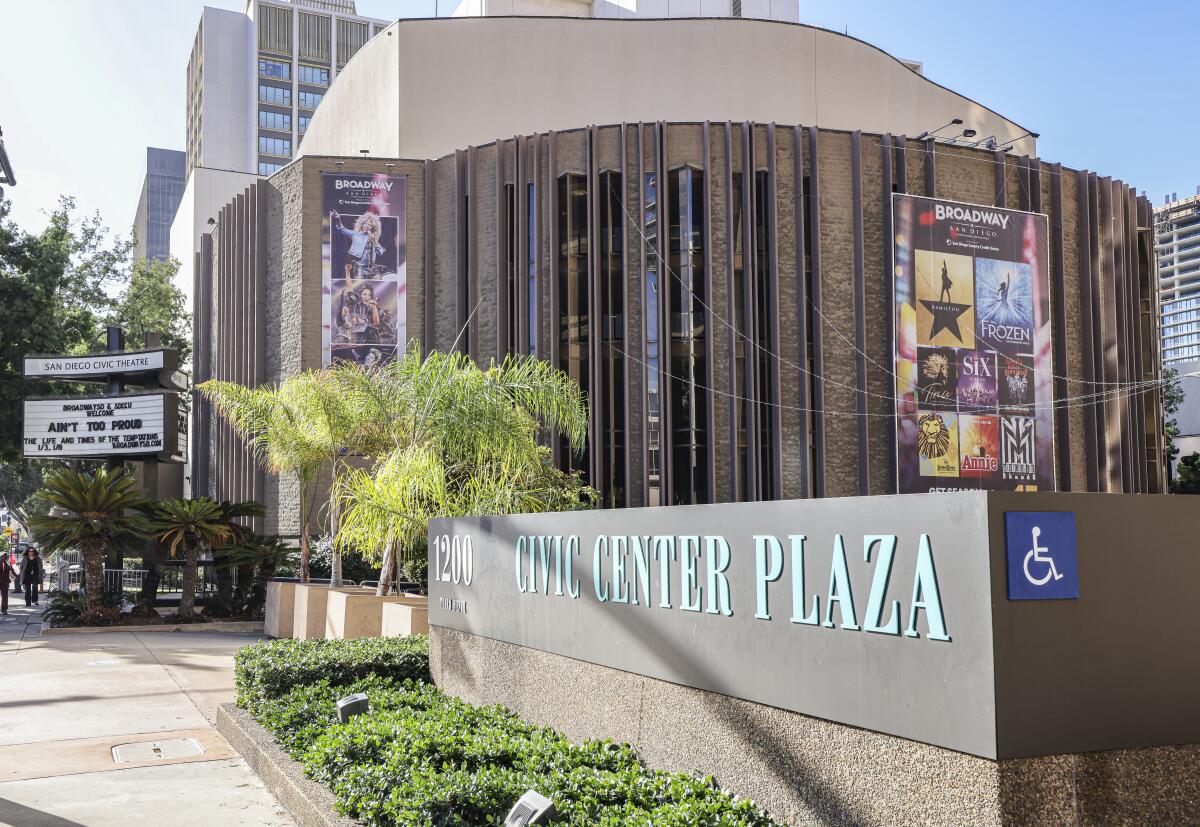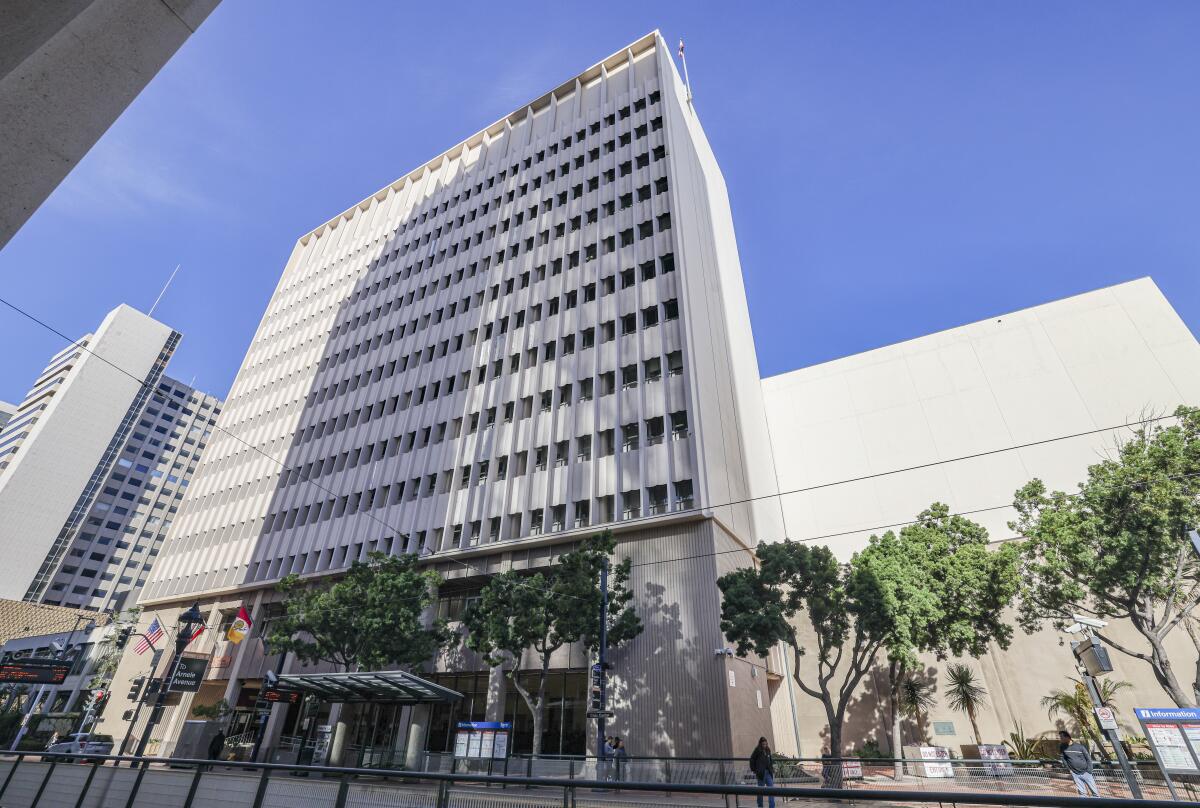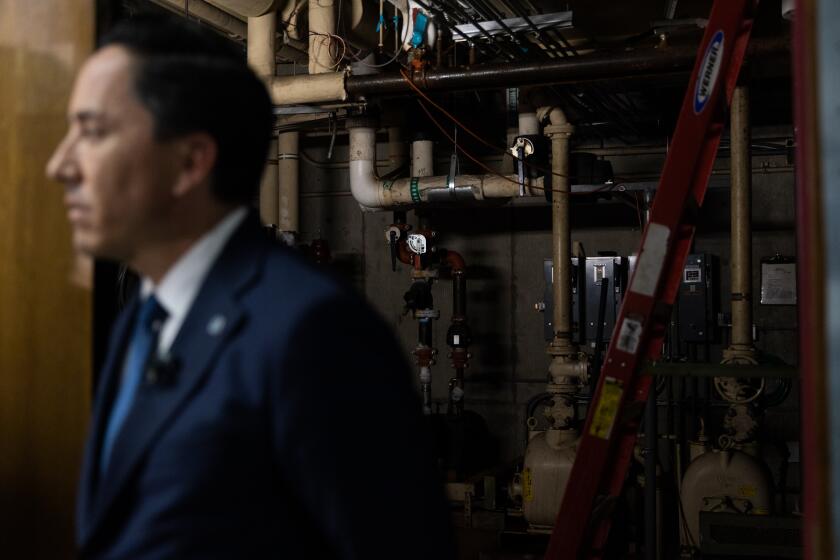It’s official: San Diego’s City Hall complex is being advertised for sale or lease

Notice of availability starts the clock on a 60-day window for interested parties to propose a redevelopment plan that includes at least 25% of affordable housing units.
- Share via
San Diego — San Diego’s Civic Center real estate, or roughly eight acres in the heart of downtown, is officially on the market.
Friday, the city of San Diego published what’s called a “notice of availability,” kick-starting a solicitation process under California’s Surplus Land Act, which regulates how municipal agencies can offload their excess land and prioritizes the production of housing for low-income families.
This story is for subscribers
We offer subscribers exclusive access to our best journalism.
Thank you for your support.
The notice alerts affordable housing developers registered with the state that the city intends to sell or lease its surplus property at 202 C St., 1100 and 1200 Third Ave., 1101 and 1265 First Ave., 201 A St. and 101 Ash St. And it starts the clock on a 60-day window for interested bidders to respond with redevelopment plans that include at least 25% of residential units reserved for lower-income households.
Prospective buyers have through July 5 to submit a letter of interest.
The action represents a potential turning point in a decades-long effort, resurrected by Mayor Todd Gloria last year, to replace San Diego’s 58-year-old City Hall. Proceeds from the sale or lease of the five blocks of advertised land will help cover the costs of a new City Hall on an adjacent block at 1222 First Ave., officials have said.
“I’m excited to get the revitalization project launched and see the vision put forward by potential partners to transform this underused land in the heart of downtown into affordable homes and great public spaces,” Gloria said in a statement to the Union-Tribune. “This is a once-in-a-generation opportunity to reshape our civic core into something that will serve San Diegans and make them proud of their city.”
Specifically, San Diego is offering for sale or lease the four blocks commonly known as the Civic Center — bounded by A Street and C Street to the north and south, and First Avenue and Third Avenue to the east and west — and a fifth block at 101 Ash St., home to an empty and asbestos-ridden office tower. The civic complex includes the City Administration Building (aka City Hall), the recently acquired Civic Center Plaza office tower, Golden Hall, a public plaza, parking garage and the 3,000-seat Civic Theatre.
After decades of failed attempts, the city is pressing forward with an effort to make its Civic Center real estate available for redevelopment while simultaneously pursuing a new home for city workers
The city will solicit bids according to the Surplus Land Act, which means interested developers must deed restrict at least 25% of proposed residential units for families making 80% or less of the area median income. The median income for a family of four in San Diego is $106,900. After the 60-day submission window, the law requires the city to engage in a 90-day negotiation period with respondents and give “first priority” to the entity proposing the highest number of affordable housing units.
Although not a condition of the state law, the city is requiring bidders to incorporate, on-site or off, an undefined number of residential units for people making 30% or less of the area median income, meaning housing for homeless individuals. Otherwise, the notice of availability identifies a handful of other preferences, including, “the city’s desire to preserve a theatre presence ... if practical.” The document notes that the city also wants projects with middle-income housing, connections to transit and labor union commitments.
Given the conditions, developer interest in the parcels could be limited to firms that specialize in using state and federal tax credit programs to finance the construction of subsidized units, said real estate analyst Gary London, who is a principal of local firm London Moeder Advisors.

“It’s unlikely that commercial developers are going to be as interested at this stage,” he said. “There’s so much emphasis on housing, and there’s so much emphasis on low- and moderate-income housing, that it threatens the very opportunity that a transformative five-block, downtown San Diego redevelopment presents.”
The requirements could torpedo creativity and compromise the feasibility of projects, said London, who takes issue with the state’s one-size-fits-all approach to land-use regulations.
“I do expect that developers will invite themselves to the party, but I don’t know how many will want to go forward in the end,” he said.
The approach, then, may also undermine some of the big-picture thinking advanced by the Civic Center Revitalization Committee. The volunteer group of nearly two dozen local leaders and stakeholders, organized by Gloria in September, drafted a manifesto that encourages prospective developers to create iconic buildings and celebrated public spaces.
The affordable housing requirements will also limit how much money the city pockets in the end.
London’s partner Nathan Moeder has estimated that the market value of the five blocks is $120 million, assuming a value of $400 per square foot. The potential price tag doesn’t reflect discounts applied for affordable housing.
“When the deal gets negotiated, it’s going to be based on whatever the residual is and what can be built on [the land]. The residual for below-market-rate housing is going to be dramatically lower than that of market-rate housing,” London said. “Everybody is going to lose. The city is going to lose in terms of what they can get for the property. And developers are going to lose in terms of what they can build that’s feasible.”
The Civic Center real estate competition is modeled after the contest for the city’s sports arena site.
Development team Midway Rising was selected by San Diego City Council members in September to lease and redo the city’s land at 3220, 3240, 3250 and 3500 Sports Arena Blvd. The group’s plan calls for 4,250 apartment homes, a new 16,000-seat arena, a 200-room hotel, and 20 acres of plaza and park space. The city and the developer are in the midst of a two-year negotiation period. To date, proposed terms, including any anticipated lease payments, have not been publicly disclosed.
More to Read
Updates
8:35 a.m. May 6, 2023: This article was updated with a quote from Mayor Todd Gloria.
Sign up for Essential California
The most important California stories and recommendations in your inbox every morning.
You may occasionally receive promotional content from the Los Angeles Times.












